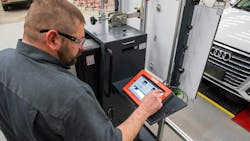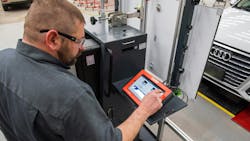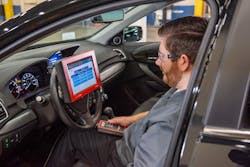Making a Case for ADAS
The U.S. Department of Transportation’s National Highway Traffic Safety Administration’s Federal Motor Vehicle Safety Standard No. 127 ruling, which will make automatic emergency braking standard to help reduce rear-end crashes by September 2029, means that collision repair shops need to be more meticulous about advanced driver assistance systems, and do them by the book.
As vehicles with ADAS technology become more prevalent in collision shops, Steve Dawson of Hunter Engineering said one of the big challenges today is that calibration systems that were once individual are now intertwined. Adding to the challenge of deciphering ADAS is when cars use these systems to interact natively on the driver’s behalf (e.g., the aforementioned automatic emergency braking).
Systems such as those require properly aligned ADAS components that have travel speeds and direction calibrated accurately, adaptive cruise control functioning to follow cars at a safe distance, and no corrective action needed. If a car is off half a degree from the thrust line, automatic corrective action may be applied unintentionally and could create a serious hazard on the road.
ADAS by the Numbers:
- 5 million vehicles require ADAS service in an independent shop in 2023
- $283 million in calibration work outsourced
- 90% of ADAS work is outsourced to mechanical repair shops
- 75% of ADAS calibrations outsourced to collision shops 60% of passenger vehicles registered in the U.S. have ADAS components that need calibration of touched, moved, or replaced
When to Recalibrate
All OEMs require ADAS calibration after a collision. “If we touch this system, if we just align the car, it needs to be recalibrated,” Dawson said. Collision repair shops need to pull up repair procedures for alignments, and if shops are subletting ADAS work, the subcontracting partner, be it another shop, dealership, or mobile technician, should know what has to happen for a proper collision alignment.
“There are a number of things that have to be verified, and the other shop must know what to do,” Dawson said, adding that in the long run, all collision repair shops should provide ADAS. “I want you to think about it. You’re going to need to be in the ADAS business. It’s going to be like having a paint booth in a couple of years. You can be subletting 50% of your profits if you don’t do (ADAS) in-house.”
Where Do ADAS Systems Need Calibration?
- Collision
- Sensor removal or replacement
- Lift, level, or lower vehicle (change ride height)
- Wheel alignment
- Windshield
- Mirror and underhood work
- Tire/wheel package upgrades (change in overall diameter)
⠀
He stressed the need for shops to use the right tools (including OEM tools), have trained technicians who are versed in electrical diagnostics, and access to OEM websites for files to download firmware to communicate with the car and above all, for the technician performing the calibration to follow OEM procedures and make sure the vehicle is on a level surface.
“When we’re talking about ADAS, it’s about having the right tools to work effectively,” Dawson said. “And it’s critical that we get the training that we need and that we’re doing the most accurate calibrations that we can, and we’re following those OEM procedures.”
Additional Considerations
Dawson called ADAS calibration a team sport — everyone in the shop needs to be involved, from estimators to the front office. “It’s critical to have a process in place for liability and making sure nothing falls through the cracks,” Dawson said.
For some shops, however, it may take getting through some red tape to begin calibrating vehicles in-house. Dawson has observed that some shops have been told by insurance companies that they won’t cover ADAS performed in the shop. He said shop owners need to talk to their insurance companies and attorneys to get on the right side of liability, particularly when outsourcing the work. “Your shop is liable for the work of the (repairing partner). All processes must be written down and documented, or they didn’t happen,” Dawson said.
ADAS and Profitability
For many shops, ADAS calibrations open the door to a significant annual profit center. Dawson said collision shops offering ADAS can add $140,000 per year of additional revenue by doing ADAS calibrations in-house. As sensors become more complex, the average charge for calibration changes. While equipment cost and space are often a deterrent for many shops, Dawson said most ADAS can be completed within a modest footprint that’s well-lit. He recommended shops keep digital documentation showing visually what needs to be done.
“(ADAS calibration) is doable in many of your shops, but it requires that your shop floors are in good shape. Space is different by manufacturer. Use the resources you have before you sublet. You may be able to do a lot of calibrations in the space you have,” Dawson said.
About the Author
Chris Jones
Group Editorial Director
Chris Jones is group editorial director for the Vehicle Service & Repair Group at EndeavorB2B.
A multiple-award-winning editor and journalist, and a certified project manager, he provides editorial leadership for the auto care industry's most trusted automotive repair publications—Ratchet+Wrench, Modern Tire Dealer, National Oil & Lube News, FenderBender, ABRN, Professional Distributor, PTEN, Motor Age, and Aftermarket Business World.
Subscribe to receive news and updates from any of these industry-leading brands.



